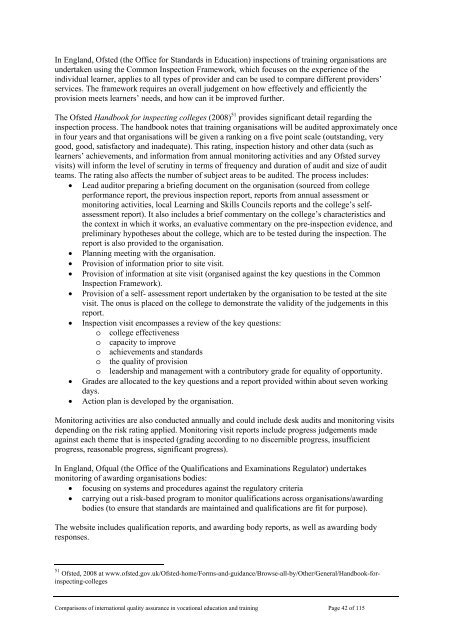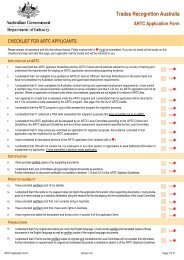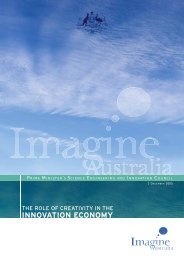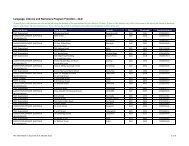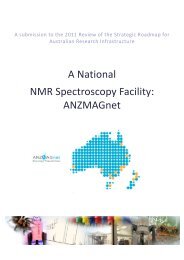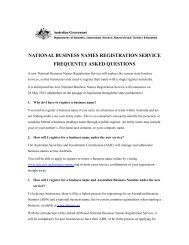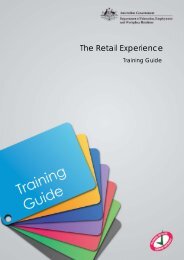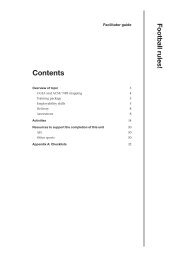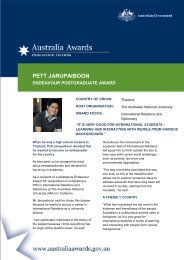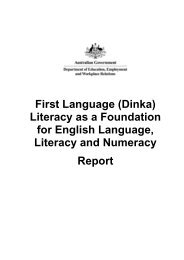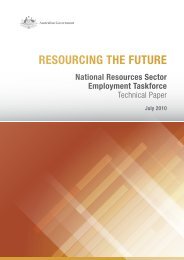Review - Department of Innovation, Industry, Science and Research
Review - Department of Innovation, Industry, Science and Research
Review - Department of Innovation, Industry, Science and Research
You also want an ePaper? Increase the reach of your titles
YUMPU automatically turns print PDFs into web optimized ePapers that Google loves.
In Engl<strong>and</strong>, Ofsted (the Office for St<strong>and</strong>ards in Education) inspections <strong>of</strong> training organisations are<br />
undertaken using the Common Inspection Framework, which focuses on the experience <strong>of</strong> the<br />
individual learner, applies to all types <strong>of</strong> provider <strong>and</strong> can be used to compare different providers’<br />
services. The framework requires an overall judgement on how effectively <strong>and</strong> efficiently the<br />
provision meets learners’ needs, <strong>and</strong> how can it be improved further.<br />
The Ofsted H<strong>and</strong>book for inspecting colleges (2008) 51 provides significant detail regarding the<br />
inspection process. The h<strong>and</strong>book notes that training organisations will be audited approximately once<br />
in four years <strong>and</strong> that organisations will be given a ranking on a five point scale (outst<strong>and</strong>ing, very<br />
good, good, satisfactory <strong>and</strong> inadequate). This rating, inspection history <strong>and</strong> other data (such as<br />
learners’ achievements, <strong>and</strong> information from annual monitoring activities <strong>and</strong> any Ofsted survey<br />
visits) will inform the level <strong>of</strong> scrutiny in terms <strong>of</strong> frequency <strong>and</strong> duration <strong>of</strong> audit <strong>and</strong> size <strong>of</strong> audit<br />
teams. The rating also affects the number <strong>of</strong> subject areas to be audited. The process includes:<br />
• Lead auditor preparing a briefing document on the organisation (sourced from college<br />
performance report, the previous inspection report, reports from annual assessment or<br />
monitoring activities, local Learning <strong>and</strong> Skills Councils reports <strong>and</strong> the college’s selfassessment<br />
report). It also includes a brief commentary on the college’s characteristics <strong>and</strong><br />
the context in which it works, an evaluative commentary on the pre-inspection evidence, <strong>and</strong><br />
preliminary hypotheses about the college, which are to be tested during the inspection. The<br />
report is also provided to the organisation.<br />
• Planning meeting with the organisation.<br />
• Provision <strong>of</strong> information prior to site visit.<br />
• Provision <strong>of</strong> information at site visit (organised against the key questions in the Common<br />
Inspection Framework).<br />
• Provision <strong>of</strong> a self- assessment report undertaken by the organisation to be tested at the site<br />
visit. The onus is placed on the college to demonstrate the validity <strong>of</strong> the judgements in this<br />
report.<br />
• Inspection visit encompasses a review <strong>of</strong> the key questions:<br />
o college effectiveness<br />
o capacity to improve<br />
o achievements <strong>and</strong> st<strong>and</strong>ards<br />
o the quality <strong>of</strong> provision<br />
o leadership <strong>and</strong> management with a contributory grade for equality <strong>of</strong> opportunity.<br />
• Grades are allocated to the key questions <strong>and</strong> a report provided within about seven working<br />
days.<br />
• Action plan is developed by the organisation.<br />
Monitoring activities are also conducted annually <strong>and</strong> could include desk audits <strong>and</strong> monitoring visits<br />
depending on the risk rating applied. Monitoring visit reports include progress judgements made<br />
against each theme that is inspected (grading according to no discernible progress, insufficient<br />
progress, reasonable progress, significant progress).<br />
In Engl<strong>and</strong>, Ofqual (the Office <strong>of</strong> the Qualifications <strong>and</strong> Examinations Regulator) undertakes<br />
monitoring <strong>of</strong> awarding organisations bodies:<br />
• focusing on systems <strong>and</strong> procedures against the regulatory criteria<br />
• carrying out a risk-based program to monitor qualifications across organisations/awarding<br />
bodies (to ensure that st<strong>and</strong>ards are maintained <strong>and</strong> qualifications are fit for purpose).<br />
The website includes qualification reports, <strong>and</strong> awarding body reports, as well as awarding body<br />
responses.<br />
51 Ofsted, 2008 at www.<strong>of</strong>sted.gov.uk/Ofsted-home/Forms-<strong>and</strong>-guidance/Browse-all-by/Other/General/H<strong>and</strong>book-forinspecting-colleges<br />
Comparisons <strong>of</strong> international quality assurance in vocational education <strong>and</strong> training Page 42 <strong>of</strong> 115


